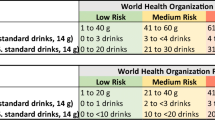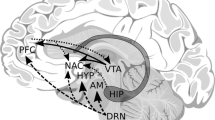Summary
This investigation concerns the evolution of alcoholism in the aged. One hundred ninety seven (197) former alcoholics over 65 years of age were studied. The average was 74 and an average of 25.6 years had elapsed since the first psychiatric hospitalization during which a diagnosis of alcoholism occurred. Contrary to the generally accepted notion of the immutability of drinking behavior over time, the results indicate that improvement over this many years is amazingly frequent. Significant decrease in alcohol consumption occurred in almost two-thirds of the group. Even without total abstinence, a reduction to normal use of alcohol occurred in over one-quarter of the subjects. There was also a significant decrease in previously established psychiatric diagnoses such as, depression, mania, aggressivity either on psychological or behavioral levels. Nine percent showed severe senile changes and dementia, and this percentage, although probably higher than average for a non-alcoholic cohort, was lower than expected. There was frequent stabilization of the subject's social situation, which appeared much less conflicted than their earlier interpersonal relations, although most of them led relatively dependent lives. In summary, two-fifths of the subjects were in satisfactory or even good condition from the psychiatric standpoint, and only one-fifth showed a clearly pathological psychiatric condition. Roughly one-third of the subjects showed a mixed adjustment without major symptoms or acute problems. Age itself, physical health, and social and employment status were all clearly related in a statistically significant way to the outcome as assessed in this study. Historical data, onset of alcoholism, or age of first diagnosis were not significantly related to outcome and gender, intelligence and body type played no role at all. The significance of the results including methodological reservations are discussed and the practical and theoretical consequences of these findings are outlined.
Résumé
Dans le même matériel que celui utilisé précédemment pour un travail sur la mortalité des alcooliques, l'évolution de l'alcoolisme dans la vieillesse a été étudiée par l'examen catamnestique direct de 197 anciens patients alcooliques, ayant tous survécu au-delà de 65 ans. — Contrairement à des notions établies, cette enquête, effectuée à l'âge moyen de 74 ans, en moyenne 25; 6 ans après la première hospitalisation psychiatrique, a démontré des améliorations tardives étonnamment fréquentes, mises en évidence dans les aspects évolutifs suivants: 1. Dans la sénescence, la consommation alcoolique avait diminué chez une majorité de presque 2/3 des cas. Même sans abstinence totale elle s'était normalisée chez plus d'un quart. 2. Les troubles psychiques surajoutés (dépressions, délires, agressivité, etc.) tendaient également à diminuer. — 3. Avec un quart environ de détériorations psychoorganiques moyennes et graves (9% pour les seules détériorations graves équivalentes à des démences avérées), le taux de détérioration, tout en dépassant probablement celui de la population moyenne, semblait relativement faible. — 4. L'adaptation sociale se stabilisait souvent dans une situation de dépendance accrue, avec des contacts sociaux plutôt pauvres mais moins conflictuels qu'autrefois. — 5. Dans l'ensemble, l'équilibre psychique global était bon ou satisfaisant chez presque 2/5 des cas, moyen chez environ 1/3 et franchement mauvais seulement chez environ 1/5. — 6. Statistiquement, des facteurs actuels comme l'âge, la santé physique, la situation sociale et le niveau d'activité étaient le plus étroitement reliés aux différents aspects de l'évolution dans la vieillesse, alors que les divers facteurs anamnestiques, y compris le début des abus alcooliques et le diagnostic initial ne jouaient qu'un rôle restreint. Le sexe, l'intelligence et le type constitutionnel restaient sans influence. Finalement, la signification des résultats est précisée du point de vue méthodologique et discutée dans ses conséquences pratiques et théoriques.
Zusammenfassung
Nach einer vorgängigen Mortalitätsstudie untersuchten die Autoren katamnestisch im gleichen Material die Entwicklung des Alkoholismus im höheren Alter bei 197 ehemaligen Alkoholikern, die sämtliche das 65. Altersjahr überlebt hatten. — Entgegen gängigen Lehrmeinungen zeigte diese im Mittel im 74. Altersjahr, 25; 6 Jahre nach der psychiatrischen Ersthospitalisation vorgenommene Nachuntersuchung, daß Spätbesserungen erstaunlich häufig sind. Dies ergab sich aus folgenden Aspekten der Entwicklung: 1. Der Alkoholkonsum verminderte sich in der Seneszenz bei fast 2/3 der Probanden. Selbst ohne völlige Abstinenz normalisierte er sich bei mehr als 1/4. — 2. Zusätzliche psychische Störungen wie Depression, Wahn, Aggressivität usw. verminderten sich ebenfalls. — 3. Mit rund 1/4 mittleren und schweren psycho-organischen Syndromen (9% schwere, einer Demenz gleichkommende Abbauerscheinungen) erschien der Prozentsatz intellektueller Ausfälle, obzwar wahrscheinlich höher als in der Durchschnittsbevölkerung, niedriger als erwartet. — 4. Sozial zeigte sich oft eine Stabilisierung in einer Situation größerer Abhängigkeit bei eher beschränkten, aber im Vergleich zu früher weniger konflikthaften Uniweitbeziehungen. — 5. Gesamthaft erschien der psychische Gesundheitszustand im Alter als gut oder befriedigend bei rund 2/5 der Fälle, mittel bei rund 1/3 und eindeutig schlecht nur bei rund 1/5. — 6. Statistisch erwiesen sich aktuelle Faktoren wie das Alter, der körperliche Gesundheitszustand, die soziale Situation und der Beschäftigungsgrad als weitaus am engsten mit den verschiedenen Entwicklungsaspekten gekoppelt, während verschiedene anamnestische Faktoren, einschließlich dem Beginn des Alkoholismus und der Anfangsdiagnose, nur eine geringe Rolle spielten. Geschlecht, Intelligenz und Konstitutionstypus waren überhaupt ohne Belang. Abschließend wird die Bedeutung der Resultate methodenkritisch präzisiert und in ihren praktischen und theoretischen Konsequenzen diskutiert.
Similar content being viewed by others
Bibliographie
Ämark, C.: A study in alcoholism. Clinical, social-psychiatric and genetic investigations. Acta psychiat. neurol. scand. Suppl. 170. Copenhagen: Munksgaard 1951.
Bailey, M. B., Stewart, J.: Normal drinking by persons reporting previous problem drinking. Quart. J. Stud. Alc.28, 305–315 (1967).
Benedetti, G.: Die Alkoholhalluzinosen. Stuttgart: Georg Thieme 1952.
Bronisch, F. W.: Die psychischen Störungen des älteren Menschen. Stuttgart: Ferdinand Enke 1962.
Cavalieri, U.: Alcoolismo e vecchiaia. Longevita4, 45–48 (1954).
—: Alcool e vecchiaia; pregiudizi e nozioni. Gior. Geront.15, 37–43 (1967).
Ciompi, L.: Le vieillissement des hystériques. Etude catamnestique. Encéphale55, 287–335 (1966 a).
—: Geronto-psychiatrische Literatur der Nachkriegszeit. Ein Sammelreferat. Fortschr. Neurol. Psychiat.34, 49–159 (1966 b).
—: Etudes catamnestiques sur la vieillesse des anciens malades mentaux. Programme de recherche et résultats préliminaires. Inform. Psychiat.45, 475–485 (1969 a).
Ciompi, L.: Follow-up studies on the evolution of former neurotic and depressive states in old age. Geriatric Psychiatry vol. III, Fall 1969 b.
—: L'évolution des maladies mentales préexistantes sous l'influence de la vieillesse. Confrontat. psychiat. (Specia)5, 113–132 (1970).
—, Eisert, M.: Mortalité et causes de décès chez les alcooliques. Social Psychiatry Berl.4, 159–168 (1969).
—, Lai, G.: Dépression et vieillesse: Etudes catamnestiques sur le vieillissement et la mortalité de 555 anciens patients dépressifs. Berne: H. Huber 1969.
—, Müller, C.: Katamnestische Untersuchungen zur Altersentwicklung psychischer Krankheiten. Nervenarzt40, 349–355 (1969).
Cowen, J.: A six-year follow-up of a series of committed alcoholics. Quart. J. Alcohol.15, 413–423 (1954).
Cumming, E., Henry, W. E.: Growing old. New York: Basic Books 1961.
Dahlgren, K. G.: On death-rates and causes of death in alcohol addicts. Acta psychiat. neurol. scand.26, 297–311 (1951).
Davies, D. L.: Normal drinking in recovered alcohol addicts (Comment by various correspondents). Quart. J. Stud. Alc.24, 109–121, 321–332 (1963).
Drew, L. R.: Alcoholism as a self-limiting illness. Quart. J. Stud. Alc.29, 956–967 (1968).
Ellermann, M.: Social and clinical features of chronic alcoholism (Based on a study of 231 male patients). J. nerv. ment. Dis.107, 556–568 (1948).
Favre, A., Meuron, B. de: Aspect psychosocial de l'alcoolisme du 3ème âge. Praxis52, 711–716 (1963).
Fouquet, P.: Névroses alcooliques. Encyclopédie médicochirurgicale, 1955, Psychiatrie, tome II: 37380 C 10.
Goodman, L. A.: Simultaneous confidence intervals for contrasts among multinomial populations. Ann. math. Statist.35, 716–725 (1964).
Igert, C.: La détérioration mentale globale des alcooliques. Vie méd.46, 1725–1729 (1965).
Jellinek, E. M.: L'étude scientifique du problème de l'alcoolisme. Colloque européen sur l'alcoolisme, Copenhague 1951.
— Les phases de la toxicomanie alcoolique. Organisation Mondiale de la Santé, Série de rapports techniques no. 48, Genève 1952, pp. 28–42.
Johannes, K., Giovanardi, F.: L'alcoolismo nell'età senile (La patologia in génère nel bevitore anziano). Gior. Geront.15, 136–144 (1967).
Jones, M. C.: Life history variables as related to adult drinking patterns. In: 6th Intern. Congress of Geront. Copenhagen, 1963.
Kay, D. W. K., Beamish, P., Roth, M.: Old age mental disorders in Newcastle-upon-Tyne. Part II: A study of possible social and medical causes. Brit. J. Psychiat.110, 668–682 (1964).
Kendell, R. E.: Normal drinking by former alcohol addicts. Quart. J. Stud. Alc.26, 247–254 (1965).
Kraepelin, E.: Psychiatrie. Ein Lehrbuch für Studierende und Ärzte. Leipzig1910, 8. Aufl. Bd. II, p. 114.
Kryspin-Exner, K.: Psychosen und Prozeßverläufe des Alkoholismus. Wien: C. Ueberreuter 1966.
Lemere, F.: What happens to alcoholics. Amer. J. Psychiat.109, 674–676 (1953).
Löwenthal, M. F., Berkmann, P. L.: Aging and mental disorders in San Francisco. Jossey Bass Inc. San Francisco 1967.
Di Macco, G.: Alcoolismo e senescenza. Riv. Geront. Geriat.10, 217–221 (1961).
Madeddu, A.: Alcoolismo e vecchiaia; incidenza della patologia mentale, alcune considerazioni clinico-statistiche. Gior. Geront.15, 51–61, 1967.
Müller, C.: Vorläufige Mitteilung zur langen Katamnese der Zwangskrankheiten. Nervenarzt24, 112–115 (1953).
—: Über das Senium der Schizophrenen, zugleich ein Beitrag zum Problem der schizophrenen Endzustände. Bibl. psychiat. Neurol. Basel,106, 1–82 (1959).
—: Manuel de géronto-psychiatrie. Paris: Masson & Cie 1969.
— La schizophrénie dans la sénescence très avancée (à paraître).
Neugarten, B.: Personality in middle and late life. New York: Atherton Press 1964.
Nielsen, J.: Geronto-psychiatric period-prevalence investigation in a geographically delimited population. Acta psychiat. scand.38, 307–330 (1962).
Pattison, E. M., Headley, E. B., et al.: Abstinence and normal drinking. Quart. J. Stud. Alc.29, 610–633 (1968).
Primrose, E. J. R.: Psychological illness: a community study. London 1962.
Riegel, K. F.: Personality theory and aging. In: Handbook of aging and the individual. Ed.: J. E. Birren. Chicago: Chicago Press 1959, pp. 797–851.
Saint-Paul, H. de: Katamnesen der Alkoholiker der Anstalt Königsfelden 1914–1923. Diss. Erlangen 1928.
Selzer, M. L., Holloway, W. H.: A follow-up of alcoholics committed to a State Hospital. Quart. J. Alcohol.18, 98–120 (1957).
Sheldon, I. H.: The social medicine of old age. Oxford: Univ. Press 1948.
Simon, A., Neal, M. W.: Patterns of geriatric mental illness. Chap. 21 in: R. H. Willaims, C. Tibbitts and W. Donahue (Eds.): Processes of aging, vol. I. New York: Atherton Press 1963, pp. 449–471.
Tähkä, V.: The alcoholic personality. The Finnish Found. Alc. Studies, vol. 13, Helsinki 1966.
Walton, H. J.: Personality as a determinant of the form of alcoholism. Brit. J. Psychiat.114, 761–766 (1968).
Wieser, S.: Alkoholismus II: Psychiatrische und neurologische Komplikationen. Fortschr. Neurol. Psychiat.33, 349–409 (1965).
—: Alkoholismus III: Katamnesen und Prognose. Fortschr. Neurol. Psychiat.34, 565–588 (1966).
—: Kunad, E.: Katamnestische Studien beim chronischen Alkoholismus und zur Frage von Sozialprozessen bei Alkoholikern. Nervenarzt36, 477–483 (1965).
Wyss, R.: Klinik des Alkoholismus. Psychiat. der Gegenwart, Band II. Berlin-Göttingen-Heidelberg: Springer 1960, pp. 265–293.
Author information
Authors and Affiliations
Additional information
An erratum to this article is available at http://dx.doi.org/10.1007/BF00578370.
Rights and permissions
About this article
Cite this article
Ciompi, L., Eisert, M. Etudes catamnestiques de longue durée sur le vieillissement des alcooliques. Soc Psychiatry 6, 129–151 (1971). https://doi.org/10.1007/BF00577983
Issue Date:
DOI: https://doi.org/10.1007/BF00577983




